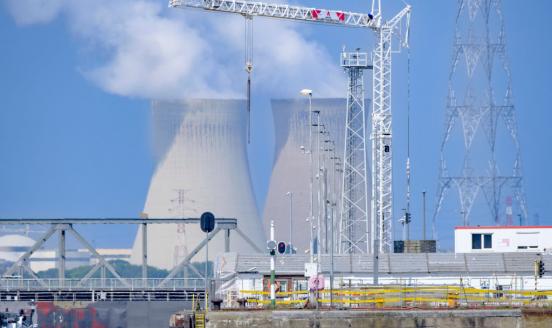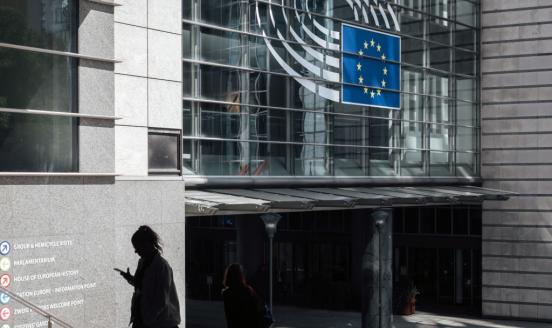Volatile energy markets expose the fragility of Europe’s capital market infrastructure
Reform of the EU central clearing framework is an essential part of capital markets union, but reform should not be driven by current energy turmoil.

Energy providers have traditionally protected themselves against wholesale-market volatility by trading on futures markets, increasing certainty about supply and prices for end-consumers. But with current energy-market uncertainty, energy providers are required to provide more collateral against the risk they will not be able to meet their commitments, implying the need for substantial liquidity. This threatens to further erode solvency in the energy sector and ultimately to disrupt physical supply.
Several countries have therefore offered substantial liquidity support to their energy providers, most notably Sweden and Finland (on 4 September; €35 billion), and the new United Kingdom government jointly with the Bank of England (on 8 September; £40 billion). Such support will inevitably be piecemeal, and could further fragment energy markets, because the fiscal headroom and political willingness to support the sector varies from country to country. At European Union level, the European Commission has said it is working on a reform of how the financial system interacts with Europe’s energy sector. This could have wider ramifications for Europe’s capital markets union.
A post-crisis push for central clearing
Via forward contracts and futures, energy providers commit to supply energy at a certain time and price. Traders guarantee to their counterparties the fulfilment of such contracts by holding an initial margin on deposit. As the underlying spot price goes up or down, that safety margin on a futures contract is adjusted through regular collateral calls, providing the same level of protection to counterparties at all times.
While futures contracts are regularly traded bilaterally on so-called over-the-counter (OTC) markets, they have increasingly moved to exchanges where trades are cleared through central counterparties (CCPs). This is also true for energy contracts, even though for these instruments clearing is largely voluntary under EU regulation. In cleared trading of energy contracts, the CCP sits in the middle of every transaction and becomes the buyer to every seller and the seller to every buyer. In this way, it ensures delivery of contracts. Initial margins, and margin calls as prices evolve, ensure that each member is protected through adequate collateral over the duration of the contract. CCPs now have a central role in defining margin policies and administering collateral calls.
In energy markets a considerable share of trades are cleared within the EU. Apart from ICE Clear Europe, which is based and supervised in London, German-owned European Commodity Clearing (ECC) and Sweden’s Nasdaq OMX Commodities Europe hold dominant positions. These CCPs and the exchanges that own them also play important roles in the physical delivery of energy on spot markets. This prominent role of EU CCPs in the clearing of energy contracts is very different from the situation with financial derivatives, for which the EU’s 15 CCPs play only a minor role and the bulk of trades are still cleared via two large CCPs in the UK.
Implications for financial stability
In both energy and financial instruments, CCP clearing supports financial stability. Complex webs of bilateral exposures and counterparty risks have been replaced by aggregated exposures managed by the clearing houses, which reap the benefits of netting and liquidity. The experience of stress in derivative markets during the onset of the COVID-19 pandemic seems to have vindicated this general policy assumption. As was well-known when CCP rules were drawn up, clearing houses re-distribute risks but may also themselves become a source of financial-system stress.
In principle, a CCP is highly protected. Given a ‘matched book’ of positions there is limited market risk in a CCP but plenty of counterparty credit risk. In the case of a member defaulting, the clearing house will allocate a ‘waterfall’ of losses successively to the collateral pledged by the firm, to its contribution to a default fund, contributions to that fund by other clearing members and ultimately to its own equity base. This seems to provide ample protection. Nevertheless, while tasked with a quasi-public good of financial stability, CCP governance is in fact geared towards safeguarding the interests of clearing house members (typically banks), among which large losses would be mutualised. Therefore, CCPs can and in exceptional circumstances do fail, as last witnessed in the collapse of the Hong Kong Futures Exchange in 1987, which presented the local government with a massive bill.
Margining requirements imposed by the CCP on its members are generally related to the level and volatility of underlying prices, which in European gas and power markets have risen steeply since February 2022 (Figure 1). While banks and other financial firms dealing in financial derivatives generally have access to central bank liquidity facilities, energy traders or other non-financial firms do not. To date, European banks have largely met the liquidity needs of energy traders through revolving credit lines. As the credit quality of the energy sector has been downgraded, this access to liquidity is by no means assured. Any credit constraints could quickly aggravate supply bottlenecks.
Europe’s half-finished CCP framework
As they have gained systemic importance as inter-connectors of the financial system, CCPs have become, much like the largest banks, too big or complex to fail. The way Europe regulates CCPs does not fully reflect their significance as guardians of financial stability.
Like most other advanced economies, the EU has adopted regulations requiring derivatives to be traded through CCPs. An EU regulation came into effect already in 2012 (648/2012, known as EMIR), mirroring a similar requirement for central clearing in the US Dodd-Frank Act. However, unlike in banking, the EU’s framework for supervision and crisis management of CCPs is still fragmented between EU states.
A 2020 update of EMIR tasked the European Securities and Markets Authority (ESMA) with authorising third country CCPs for clearing services within the EU, once the European Commission has deemed host country regulation as equivalent. Belatedly, this recognised the global nature of the clearing business and the need for a transition for the UK’s main CCPs in the context of Brexit. However, ESMA’s powers remain fairly limited, as it conducts only light peer reviews and stress tests. Another EU law, a 2021 regulation on CCP resolution (Regulation (EU) 2021/23), resulted in no centralisation of crisis management or backup facilities, even though clearing houses could present massive losses to the budgets of individual EU states.
Since early 2022, the Commission has again been reviewing the governance and regulation of clearing within the EU. This review has taken on extra urgency, as the recognition of equivalent supervision of UK CCPs is set to expire in 2025, and because EU policymakers have for some time pushed for a relocation of the clearing of euro-denominated derivative contracts into the EU. The Commission should now prepare the ground for more liquid markets as clearing shifts from the UK.
Minimising spillovers from the energy market turmoil
However, the much-needed long-term reform of the EU’s CCP framework should not be driven by energy-market turmoil. There is an overriding policy interest in the continued functioning of markets in energy derivatives to help manage risks for end-consumers. Central clearing, rather than bilateral over-the-counter trades, should remain the preferred option for settlement, with a low threshold for mandatory clearing.
CCPs normally require collateral to be in cash or sovereign securities; EMIR rightly requires “high quality liquid assets”. The Commission has suggested (see the introduction, above) that a wider set of collateral should now be eligible, for instance by including less than fully-backed bank guarantees, but this is problematic, in particular if not mirrored in the UK which defines a regulatory benchmark for the vast bulk of derivative trades.
EU regulation governs risk models of CCPs and collateral collected from clearing house members, though clearing members in turn set collateral requirements for their clients, such as energy traders, independently. While the regulation defines a baseline, actual margins required from market participants are often subject to add-ons. It would be short-sighted to intervene in CCP risk models to mitigate liquidity pressures among energy providers. This would not only put the soundness of individual CCPs at risk but would also discourage the hoped-for move of clearing from the UK to an ostensibly more light-touch EU regime. The European Central Bank has called for a review of margining practices and these should be made more transparent, though this is unlikely to help in the near term.
The Commission also charts a more comprehensive agenda in facilitating liquidity access for energy firms meeting margin calls. If individual governments were to go beyond the present fragmented response, a central bank liquidity line would likely be required, something the ECB has already rejected .
A fully fleshed-out EU CCP framework
A fully fledged clearing infrastructure will be an essential foundation of Europe’s capital markets union. A more resilient crisis management framework is needed in light of the systemic importance of CCPs and reflecting the enormous risks they could create. This should be the focus of any reform of the regulation and will also require reconfiguring powers in supervision.
Complexity, interconnectedness and potential cross-border spillovers from CCP risks call for ESMA to have much stronger powers. In addition, there will need to be strategy for managing the broader financial system effects of central clearing, and on the interconnections between energy and financial markets. There is a clear need for a macroprudential policy and integrated liquidity provision. This should address spillovers from central clearing and underpin stability within the entire EU capital markets union, including non-financial market participants such as energy traders.
Resolution powers and a liquidity backup should also be pooled at the level of the euro area. While most clearing house members are regulated banks with access to ECB liquidity, those outside the banking sector or outside the euro area will be more constrained. Since 2020, a limited liquidity backstop for the Single Resolution Board from the ESM has beefed up the credibility of any resolution of a failing euro-area bank. CCPs and their members may similarly face enormous liquidity pressures in a crisis scenario, in extremis leading to the resolution of a CCP. A robust crisis management framework would reflect the systemic role of CCP, and would be reflected in private risk management and collateral requirements, including during calm market phases.



